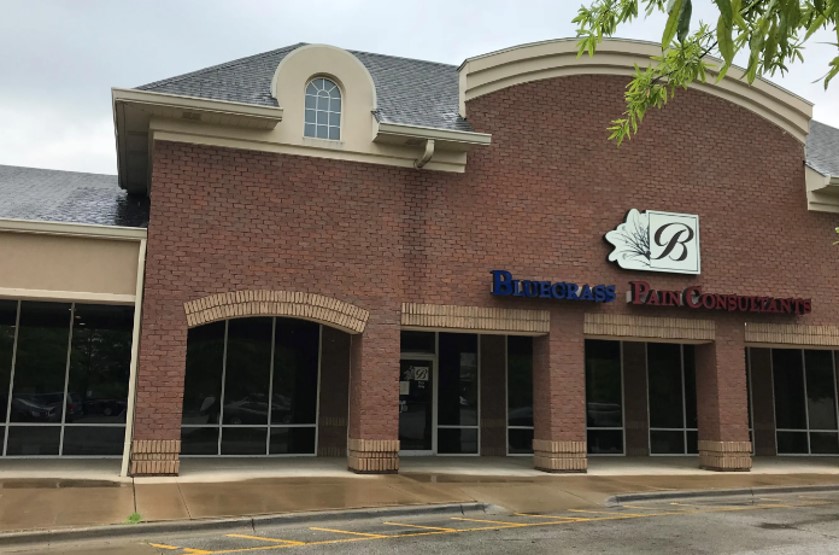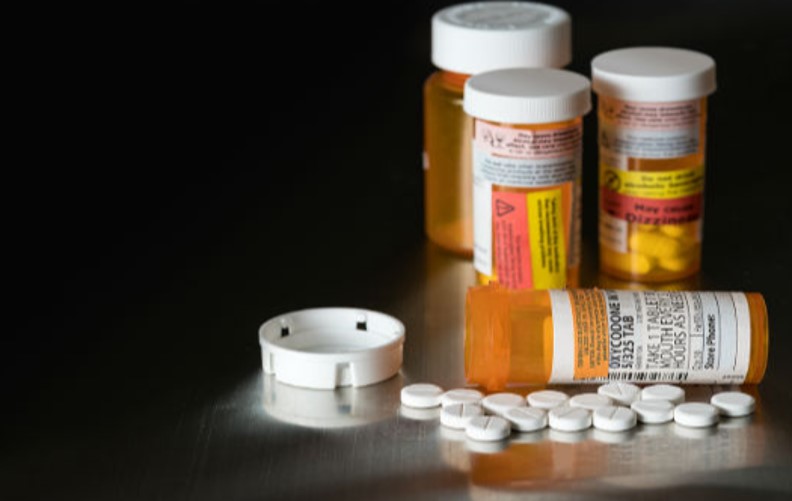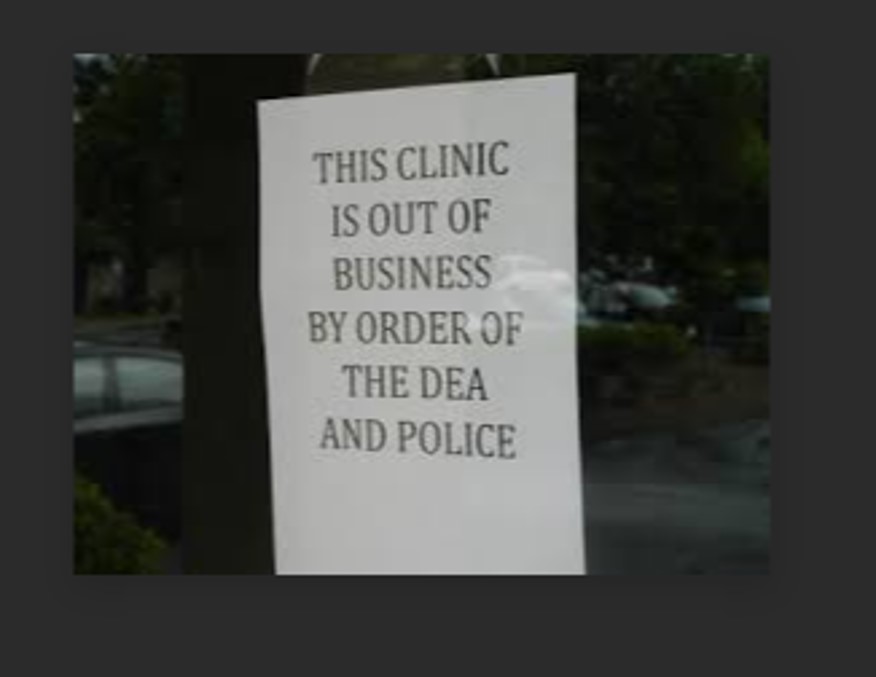
For more than a decade, doctors, dentists, and nurse practitioners have liberally prescribed opioid pain pills despite mounting evidence that people were becoming addicted and overdosing on the powerful pain medications.
Medical professionals are increasingly operating pain pill mills disguised as pain relief or pain management clinics, wellness centers, functional medicine clinics, and urgent care centers. These owners and operators continually devise methods to subvert regulations and investigations while attracting local and out-of-state patients.
IMPORTANT NOTE: Not all pain management clinics are engaged in criminal activity. Many clinics across the state operate legally and employ trained personnel and doctors who treat patients who legitimately suffer from chronic pain.
Prescribers can determine whether patients are already receiving painkillers or other controlled substances from other sources, a practice known as doctor shopping. Patients with this type of history are at high risk for addiction and overdose and may be selling drugs illicitly.
KNOXVILLE, TENNESSEE. Sharon Naylor, 58, of Junction City, Kentucky, pleaded guilty to one count of maintaining a drug premise and another count of money laundering, according to the DOJ.
Naylor was a Nurse Practitioner who Owned and Managed the Lafollette Wellness Center, a non-insurance, cash-equivalent pain clinic that operated in Campbell County.
“Naylor continued to own and operate LWC, despite knowing that the medical director, co-defendant Dr. Henry Babenco, and the Physician’s Assistant, co-defendant Alicia Taylor, were prescribing opioids to patients outside professional practice and for no legitimate medical purpose.
Naylor, Babenco, Taylor, and office manager Gregory Madron were charged with drug-related offenses in 2019 during a a multi-state Appalachian Regional Prescription Opioid Strike Force operation.
Dr. Henry Babenco, 58, of Paducah, Kentucky, was charged with conspiracy to distribute Schedule II drugs and money laundering. Dr. Henry Babenco died in a plane crash in February 2021.
Naylor was ordered to forfeit the proceeds she made from her crime, which included approximately $1.9 million in property, cash, gold and silver coins, and bouillon. All of those were seized by the United States. Taylor pleaded guilty to her role in the distribution of controlled substances.

Federal Agencies Raid a Northern Kentucky Pain Medicine Clinic (Local 12, YouTube Video)
CRESTVIEW HILLS, KENTUCKY. Dr. Kendall Hansen, Interventional Pain Specialists, Thomas More Parkway. Dr. Hansen was charged with one count of conspiracy to distribute opioids, one count of unlawful distribution of oxycodone hydrochloride, two counts of unlawful distribution of fentanyl Duragesic patch, one count of unlawful distribution of hydrocodone acetaminophen, one count of conspiracy to distribute controlled substances, one count of unlawful distribution of tramadol, and one count of unlawful distribution of phentermine HCL.
Interventional Pain Consultants was a Kentucky Professional LLC, formed on June 23, 2017, principally located in Pikeville, Kentucky, with four satellite offices located in Harold, Paintsville, Whitesburg, and Belfry. IPC provided general physician services, including pain management services, to beneficiaries, members, and others.
Dr. Gutti owned and provided physician services, including purported pain management services by, among other methods, prescribing controlled substances, namely opioids, through IPC.
According to the superseding indictment, Dr. Hansen is alleged to have knowingly and intentionally conspired with others to distribute and dispense controlled substances that were not medically necessary. Patients being treated by Dr. Hansen at Interventional Pain Specialists, PLC, where Hansen was a part owner, died of opioid overdoses after receiving prescriptions for such medications from Hansen and other IPS providers.
Despite this knowledge, the Dr. Hansen allegedly continued to prescribe opioids to his patients in high doses and in dangerous combinations with other medications.
The trial for defendant Hansen is set for January 16, 2024.
VILLA HILLS, KENTUCKY. Dr. Jay M. Sadrinia, 60, owned and operated dental clinics in Crescent Springs. Despite clear signs – including being told explicitly that his prescribing of controlled substances was dangerous and put his patients’ lives at risk – Sadrinia prescribed powerful opioids to his patients for routine dental procedures. Sadrinia was convicted of one count of unlawful distribution of controlled substances resulting in death and one count of unlawful distribution of controlled substances. The FBI and DEA investigated the case.
If you are aware of controlled substance violations in your community, you can submit your anonymous tip through the DEA online Tip Line.

ONEIDA, KENTUCKY. Dr. Bruce Coffey was indicted in October 2021 on charges of distributing and dispensing controlled substances and money laundering. Specifically, the federal government alleged that Coffey illegally distributed oxycodone pills, and laundered more than $12,000 through a bank account of his practice, Coffey Family Medical Clinic.
The indictment against Coffey centered on just 60 oxycodone pills. The investigation, which splashed into the headlines in the summer of 2018 when state and federal authorities conducted a massive raid at Coffey’s medical clinic on Underpass Drive in south Oneida, had accused Dr. Coffey of distributing millions of pain pills at a rate of more than 1,500 per day—a total of 4.9 million over an eight-year period.
While the charges against Coffey carried a maximum prison sentence of 20 years, it had been assumed that he would receive a much lighter sentence, in part because of his guilty plea. That revelation drew outrage from some, including McCreary County Sheriff Randy Waters, who told Knoxville news reporters that Coffey should have received a 20-year sentence.
It was in Kentucky that the investigation centered. While Coffey’s medical practice was located in Oneida, many of his patients were from McCreary County and surrounding Kentucky counties. It was the DEA’s regional office in Southeastern Kentucky that spearheaded the investigation.
Dr. Coffey is no longer in the medical practice. His Underpass Drive clinic burned in January 2020 — a fire that claimed several other businesses in the small medical complex. While Coffey relocated his practice to Industrial Lane, it closed for good in July 2020, and Coffey’s medical license expired in October 2021.
In addition to alleging that Dr. Coffey had prescribed nearly five million opioid pills over an eight-year period, investigators said that Coffey had pre-written prescriptions for pain pills that could be given to patients while he was not in the office. Specifically, investigators cited an instance where a patient was prescribed pain pills by Coffey while the doctor was out of state. The DEA said that insurance programs had paid at least $18 million to Coffey’s clinic during a period of six years.
Ultimately, the government’s case against Coffey centered on a single incident: When he wrote a prescription for 60 oxycodone pills to a patient in September 2016.
As part of the plea agreement, Dr. Coffey acknowledged that he prescribed the oxycodone pills in question without a legitimate medical purpose and outside the course of professional practice. He also admitted that he knew the more than $12,000 deposited in October 2016 was “criminally derived” money.
Coffey admitted to providing pre-written prescriptions for oxycodone, hydrocodone and other painkillers so that his office could furnish those prescriptions to patients in exchange for payments. For the patient at the center of the court case presented by the government, it was said that Coffey spent less than one minute with the patient and conducted no physical exam before issuing the prescription.
Coffey also agreed not to contest the forfeiture of assets and property that the DEA seized. Those seizures included more than $1.3 million from his bank accounts and in cash, along with two Mercedes-Benz GL450s.
Dr. Bruce Coffey, the prominent Oneida physician at the center of an extensive investigation into the distribution of painkillers. Coffey will serve a 40-month sentence in the custody of the Federal Bureau of Prisons, after which he will serve one year of supervised probation. He was also fined $500,000.
That judgment was handed down in U.S. District Court in Knoxville. The court recommended that Coffey’s sentence be served at a federal prison in either Lexington, KY. or Manchester, KY.
COVINGTON, KENTUCKY. Dr. Michael J. Grogan, 67, of Lakeside Park, Kentucky, was indicted by a federal grand jury for 257 counts of illegal distribution of controlled substances.
The indictment alleged that, between February 1, 2018, and February 13, 2019, Dr. Grogan was the owner and operator of Go Beyond Medicine, a medical clinic located in Crescent Springs, and Grogan unlawfully distributed and dispensed Schedule II controlled substances outside the scope of professional medical practice and without a legitimate medical purpose. According to the indictment, Grogan wrote 257 unlawful prescriptions for oxycodone.
The investigation preceding the indictment was conducted jointly by the DEA, FBI, the U.S. Department of Health and Human Services, and the Northern Kentucky Drug Strike Force. U.S. Department of Justice—Eastern District of Kentucky
According to testimony at trial, Gowder and the clinic owners worked together to run an illicit pain clinic near Chattanooga, Tennessee, called Tennessee Pain Institute, which drug addicts and drug traffickers in Kentucky and elsewhere used as their suppliers.
The evidence further revealed that after the Tennessee Department of Health investigated TPI’s doctors and federal law enforcement executed a search warrant at TPI, clinic owners Tyndale and Mithavayani opened a new pain clinic in North Carolina to cater to the same Kentucky population.
Following a four-week trial, the jury convicted Timothy Gowder, 71, from Chattanooga, Tennessee, Anwar Mithavayani, 55, and Pete Tyndale, 47, Clinic Owners from Florida, of conspiracy to distribute oxycodone and oxymorphone.
Co-defendant Larry Karr of Keavy, Kentucky, pled guilty to the oxycodone-trafficking charge and was sentenced to 108 months in federal prison.
James Bradley Combs, 41, from Woodbine, Kentucky, was convicted of possession with intent to distribute oxycodone.
Louisville Pain Clinic Closes Unexpectedly After Federal Raid (WDRB, July 2018)
LOUISVILLE, KENTUCKY. Bluegrass Pain Consultants. Patients and employees got a painful shock when the office closed. One employee said, “there were red flags from the beginning. “Every day, people have been quitting,” she said. “A lot of the providers, including two of the doctors.”
In June, federal agents raided five of their offices. “They asked us about different patients being charged for things they did not receive.”
FBI and DEA agents were in and out of the Bluegrass Pain Consultants offices in Louisville and LaGrange. The offices are located at 10241 Champion Farms Drive in Louisville; 6400 Dutchmans Parkway, Suite 60 in Louisville and 1009 New Moody Lane in LaGrange.
Patients told news reporters that some pharmacies refused to fill prescriptions from Bluegrass Pain Consultants because of the investigation.
One patient broke her back twice and had been a patient for the past seven months. She was able to get one prescription but tried getting it filled at Kroger in New Albany and was denied. She then turned to Walmart and was denied again.
“They said because Bluegrass was under investigation they were on a list that they couldn’t be honored.” “(Kroger) were kind enough to call Walmart, which is close to us also and they refused to fill it also.” finally was able to get her medication from a Walgreen’s.
According to the Bluegrass Pain Consultants website, doctors offer treatment of chronic and acute pain. Dr. Christopher Nelson is the President/CEO and Dr. Brandon Sutton and Dr. Alexander Sinofsky are also physicians with the group.
COVINGTON, KENTUCKY—Dr. Sundiata El-Amin, 69, El-Amin Clinic, a physician from Ft. Wayne, Indiana, was convicted by a federal jury of 173 drug trafficking offenses connected to his operation in Grant County.
According to the evidence at trial, Dr. El-Amin conspired with his office manager to unlawfully dispense more than 300,000 oxycodone tablets outside the scope of professional practice and without a legitimate medical purpose for approximately one year. The evidence revealed that he repeatedly issued improper prescriptions for high doses of oxycodone and regularly issued these prescriptions without examining patients.
FEDS Raid Pain Clinic. The search and seizure came after months of investigation by law enforcement agencies. Grant County Sheriff said he received complaints about suspicious activity outside the clinic after business hours.
His office manager, Wendy Price, pleaded guilty to conspiring with Dr. El-Amin to commit these offenses.
“This is another example of a medical professional being found guilty of choosing profit over medical judgment and callously fueling the opioid epidemic,” said Robert M. Duncan, Jr., United States Attorney for the Eastern District of Kentucky. “This despicable conduct represents an egregious breach of trust and does enormous damage, both to individuals struggling with addiction and to our communities. We will continue to make prosecuting this type of conduct a core priority, and we want to thank our law enforcement partners for their excellent work in the investigation of this case.”
BEREA, KENTUCKY. Pharmacist Lonnie Hubbard, age 41, was convicted of 71 counts, including fifty-six drug counts, involving the illegal dispensing of controlled substances without a legitimate medical purpose, maintaining a drug-involved premises, twelve counts of money laundering, and two conspiracy charges.
According to evidence presented at trial, from 2010 until 2015, Hubbard, who owned RX Discount Pharmacy in Berea, sold prescription pain pills without a legitimate medical purpose and sold pseudoephedrine, knowing or having reason to believe that it was being used to manufacture methamphetamine. Many of the people Hubbard sold to were addicts and drug traffickers from Madison, Rockcastle, Laurel, Clay, and other counties in central and eastern Kentucky.
The evidence further established that many of Hubbard’s customers visited pain clinics in Florida, Ohio, Tennessee, and Georgia, to obtain illegitimate prescriptions from irreputable clinics. Hubbard would charge $600 to $1,000 to fill a cocktail of prescriptions, which included excessive amounts of oxycodone. According to trial testimony, Hubbard also sold multiple boxes of pseudoephedrine at a time, at excessive prices, to drug addicts and traffickers. From 2013 to 2015, Hubbard’s pharmacy was the number one independent pharmacy retailer of Pseudoephedrine in Kentucky.
Those who obtained drugs at Hubbard’s pharmacy testified that RX Discount was one of the only places in Kentucky that would fill their out-of-state prescriptions for pain medication.
More than twenty doctors from Florida, Georgia, and Tennessee who wrote the illegal prescriptions related to this case have either surrendered their medical licenses, been indicted, or are currently under investigation.
The evidence also revealed that Hubbard made approximately $2.2 million in cash from the illegal drug sales and used that money to buy three residences, a boat, and several luxury vehicles.
“This case sends a strong message to medical professionals who dispense controlled substances: failure to exercise reasonable professional judgment by consistently ignoring suspicious behavior will not be tolerated,” said Acting U.S. Attorney Carlton S. Shier, IV. “Mr. Hubbard failed to exercise his professional responsibility and the result was an enormous amount of prescription pain pills and methamphetamine precursors being made available for illicit purposes. The great work of our law enforcement partners in this case is critical to our fight against the drug epidemic.”
The investigation was conducted by the DEA, IRS, USDA, Kentucky Board of Pharmacy, Inspector General for the Cabinet of Health and Family Services, Berea Police Department, Mt. Vernon Police Department, Madison County Sheriff’s Office, and the Appalachian HIDTA.
LEXINGTON, KENTUCKY. A former doctor in Paintsville, Ky., was sentenced to 48 months in prison for his role in a conspiracy that was responsible for illegally distributing more than 25,000 prescription pills in Eastern Kentucky.
The investigation into this case started when detectives with the Kentucky Attorney General’s Office received complaints from local law enforcement that Care More Pain Management was seeing a remarkably high volume of patients. Court records show that patient lines at Care More stretched into the parking lot.
U.S. District Judge Amul Thapar sentenced Rano Bofill, 72, for conspiracy to unlawfully dispense oxycodone. Judge Thapar also ordered that Bofill pay $15,000 in community restitution to the Commonwealth of Kentucky. Under federal law, Bofill must serve at least 85 percent of his prison sentence.
According to court documents, from January 2009 until December 2012, Bofill conspired with Tammy Cantrell and Shelby Lackey, owners of Care More Pain Management, LLC, located in Johnson County, to distribute thousands of oxycodone pills to patients without a legitimate medical purpose.
Dr. Bofill acknowledged that he wrote prescriptions for numerous patients after performing little to no examination, and, in some instances, he even signed off on prescriptions without actually ever seeing the patients. Patients who visited the clinic paid $200 for the initial visit and $185 for subsequent visits; all fees were paid in cash. Bofill admitted he saw approximately 25 patients per day and was paid between $5,000 and $6,000 per week.
For their part in the conspiracy, Lackey and Cantrell received sentences of 97 and 108 months, respectively. At the time of their guilty pleas, Cantrell and Lackey were the first pain clinic owners in the Eastern District of Kentucky to have federal convictions for illegally distributing prescription drugs.
Another doctor at the clinic, Richard Albert, pleaded guilty to a conspiracy charge; he was sentenced to 75 months in prison.
The investigation was conducted by the Kentucky Attorney General’s Office, the DEA, and the Paintsville Police Department.

Scott Gilliam, 42, Brandon Logan, 28, and his uncle, Michael Scott Logan, 38, pleaded guilty to conspiracy to distribute oxycodone.
The original investigation began 18 months before the men’s arrest when authorities received a tip. They began their investigation by making random traffic stops and searches. Eventually, they moved to an undercover investigation, learning that tens of thousands of pills were being trafficked through several states through the men’s organization.
According to investigators, the pastor and his partners had stored “tens of thousands of dollars worth of illegal pills…inside the walls of a playroom of the church,” which had shut its doors a year ago.
Police found oxycodone pills, cash, candles, wax, and containers used to ship the pills to another trafficker in Las Vegas. Police said they also found “drug paraphernalia and receipts for packages” in Michael Logan’s home.
Law enforcement suggested that the pills would have sold for as much as $40 or $45 in the region where the men were operating.
Investigators also seized $1 million in cash. Michael Logan faced between six and nine years in prison, the highest base-offense level, as he was responsible for trafficking between 10,000 to 15,000 pills.
LEXINGTON, KENTUCKY. The owner of pill mills in Georgetown, KY, and Dry Ridge, KY, which illegally dispensed prescription drugs to thousands of patients, was found guilty on all 21 counts of drug trafficking, money laundering, opening and maintaining a drug-involved premise, and conspiracy charges.
The jury returned guilty verdicts against 45 year-old Ernest William Singleton and his corporate fronts- Double D Holdings, LLC and S and R Medical Enterprises, LLC. These entities, controlled by Singleton, owned Central Kentucky Bariatric and Pain Management, Central Kentucky Family Pharmacy of Georgetown, and the Grant County Wellness Center in Dry Ridge, KY.
The two clinics were convicted of the same charges as Singleton. Double D Holdings was convicted of drug trafficking and money laundering offenses. The pharmacy was convicted of money laundering charges.
According to evidence presented at trial, starting in October 2010 and continuing until February 2013, doctors at the clinics prescribed Diazepam and Ultram outside the scope of professional practice, not for a legitimate medical purpose, and under Singleton’s direction. Singleton then used his businesses to launder the proceeds gained from the drug trafficking.
Additionally, the jury found that Singleton used the drug proceeds to purchase a house in Willisburg, KY, a boat, farmland, and farm equipment, among other items. Singleton forfeited bank accounts consisting of $427,834.34, more than 20 firearms, and over 40 pieces of farm equipment, vehicles, and livestock that either facilitated the crimes or were purchased with proceeds obtained from his criminal offenses.
The evidence at trial established that Singleton oversaw the daily operations of the clinics, influenced doctors to overprescribe drugs to patients and pressured them to see as many patients as possible. Witnesses testified that, at Singleton’s direction, one of the doctors saw more than 90 patients in a day, and another doctor visited with some patients for as little as three minutes before prescribing medication.
Testimony also revealed that when some doctors complained to Singleton about the volume of patients, he instructed them not to reduce their patient load and told them, “If we don’t give (patients) what they want, they won’t come back.” Doctors testified that they could not provide adequate medical care under Singleton’s guidelines.
Two of the doctors employed by Singleton, Lea Marlow, and Gregory White, pleaded guilty to conspiring to distribute controlled substances outside the scope of professional practice and without a legitimate medical purpose.
Other evidence established that the pain clinics operated on a cash-only basis and did not accept insurance. New patients paid approximately $250 on the first visit and $300 on subsequent visits. Investigators estimate that approximately 5,000 patients visited the clinics during the course of the conspiracy.
“Mr. Singleton is a drug dealer who used his business as a front for his criminal scheme,” said Kerry Harvey, U.S. Attorney for the Eastern District of Kentucky. “We will continue to pursue those who operate pill mills that bring so much pain to our communities. This successful prosecution exemplifies the sort of interagency collaboration that is necessary to effectively combat the scourge of illegal drug trafficking in our Commonwealth. We congratulate our law enforcement partners in this case and appreciate the great work of our trial team.”
The investigation was conducted by the DEA, IRS Criminal Investigation Division, the Kentucky Attorney General’s Office, and Kentucky State Police.
The Commonwealth of Kentucky faces a daunting challenge from the rising tide of prescription drug abuse. The mounting death toll, increased crime, enormous drain on public resources, and shattered families throughout the Commonwealth provide stark proof of the magnitude of the problem.
“We in the health care profession had a lot of years to police ourselves and clean this up, and we didn’t do it,” Kentucky physician Greg Jones, an anti-addiction specialist, said in an online training course he gives doctors in his state. “So the public got fed up with people dying from prescription drug abuse and they got together and they passed some laws and put some rules in place.”
Most states require prescribers to obtain access to PDMPs and use them at their discretion when they suspect a patient is at high risk for addiction, drug diversion, or overdose, according to the National Alliance for Model State Drug Laws.
In Kentucky, doctors and some patients complained about the requirement when it was first adopted, Ingram said. But these days, he said, he mostly hears doctors saying, “Wow, I treated that patient for 20 years and had no idea he had a drug problem.
The problem with that, said Van Ingram, Kentucky’s Director of Drug Control Policy, is “people think doctors can just look at a patient and recognize this disease of addiction, and it’s not that simple.”
“People with addictions can fool their spouses, their children, and their employers. They can definitely conceal the disease from their physician in a 15-minute visit.”

Understanding Drug Overdoses and Deaths (Centers for Disease Control and Prevention)
Researchers from the Centers for Disease Control and Prevention report that Schedule II prescription painkillers, like oxycodone, cause more drug overdose deaths than cocaine and heroin combined. Oxycodone and other Schedule II drugs have a high potential for abuse and can be crushed and snorted or dissolved and injected to get an immediate high. This abuse can lead to addiction, overdose, and sometimes death.
What is Oxycodone and How Is It Used (United States Drug Enforcement Administration)

What Are Pill Mills?
Pill mills are places where people can get prescription drugs without a legitimate medical reason. In most cases, pill mills are run by doctors or other healthcare professionals who prescribe drugs like opioids for cash. These prescriptions are often given without any medical exam or testing, and they’re usually offered in large quantities. Pill mills fuel the opioid epidemic by making it easy for people to get their hands on these dangerous drugs.
Often, these operations are in rural areas or small towns without many healthcare options. This means that people have to travel long distances to get to a pill mill, making it even easier for them to become addicted to the drugs they’re prescribed.
A few signs can indicate whether or not a doctor’s office is a pill mill. First, pill mills often prescribe large quantities of drugs without requiring a medical exam or testing.
What Are Some Signs There Is a Pill Mill In Your Area?
Pill mills have been around in almost every one of the United States. Many are found in the Southern States. However, there are still pill mills opening up around the country. If you suspect there is a pill mill in your area, some signs to confirm this may include the following:
- Cash is the only form of payment accepted.
- Physical exams are not given.
- Prescription pills are the only way doctors treat pain.
- Crowds are formed around the building in lines.
- Many cars are in and out of the building parking lot.
- Pharmacists complain about the doctors.
- Other businesses complain about the office or facility.
- Patients aren’t in the building long for their appointments.
- Shady or unusual characters around the building.
- X-rays and medical records aren’t needed for appointments.
- Doctors send patients to a specific pharmacy.
- Drugs are being used and sold right outside the building.
- Security guards are on the premises.
If you recognize any of these signs, you can submit your anonymous tip through the DEA online Tip Line and report the doctors or facility. Pill mills are a problem. If the citizens of the community report they see signs of suspicious activity and more businesses keep an eye out for the above-mentioned signs as well, hopefully, these pill mills can be limited.
“We face a moment in our country where more than 100,000 of our fellow Americans die each year from drug overdoses,” United States Attorney Christopher R. Kavanaugh said. “We must do all we can to support those battling addiction disorders and prosecute those who prey on this disease.”
If you are in Kentucky and know someone suffering from addiction, you can find help by calling 833-8KY-HELP or logging in at Findhelpnowky.org
The opioid crisis and drug overdoses continue to devastate our states and local communities.
Donations to Support this Website are Always Welcome.
If you suspect a medical office or pain management clinic may be a pill mill, it’s essential to report it to the authorities. You can submit your anonymous tip through the DEA online Tip Line.
DEA Louisville Division Serves Kentucky, Tennessee, and West Virginia
Nationwide Investigations
How Pain Doctors Massive Opioid Prescriptions Lead to Pain Pill Overdose Deaths
How Pain Clinic Owners Turned Patients’ Pain into Enormous Profits
How State and Federal Authorities are Dismantling Pill Mills in the United States
How to Recognize a Pain Pill Mill in Your Community
Authorities Crack Down on Pharmacists Fulfilling and Dispensing Massive Amounts of Pain Pills
How Authorities Are Busting Pill Mills in North Carolina & South Carolina
How Authorities Have Shuttered Georgia Pain Clinics Massive Pain Pill Distribution
How Federal Agencies Are Dismantling New York Pain Clinics Vast Pain Pill Operations
How Federal Agencies are Shutting Down Maryland Pain Clinics Operating as Pill Mills
How Authorities Are Cracking Down on Virginia Pain Clinics Massive Pain Killer Pill Operations
How Authorities Are Shutting Down Texas Pain Clinics Enormous Pill Prescriptions
How Authorities Are Cracking Down on Rogue Pain Clinics in Florida

State and Federal Authorities Are Honing in on Kentucky Pain Clinics Distributing Excessive Amounts of Opioid Painkiller Pills
ADD COMMENTS BELOW
- Moving and Relocating to Atlanta: How to Find Your New Home
- Money Matters: Insider Tips to Buying a Home
- Renting vs Owning a Home
- 3 Powerful Benefits of Using Managed WordPress Web Hosting
- Ways to Build Positive Credit
- Do It Yourself Credit Improvement Process
- Guides to Backpacking, Mountain Biking and Hiking Georgia
- How to Create an Ergonomic Workspace at Home or Work
- Backpacking, Hiking, and Camping Safety Guides
- A Trail of Clues to the Murder of Nicole Brown Simpson
- How Centra Tech’s Bitcoin Cryptocurrency Scheme Was Hatched and Discovered
- Starting a New Business as a New Mother: Tips for Thriving
- Balancing Success: Practical Self-Care Strategies for Entrepreneurs
- Guides to Backpacking and Hiking the Carolinas
- Guides to Hiking New York State and New Jersey
- Guides to Backpacking and Hiking Canada
- Guides to Hiking California and Nevada
- Email Marketing Campaigns for Small Business Owners
- The Tragic Murder of Rebecca Postle Bliefnick
- How a Grad Student Murder Spotlights Female Joggers’ Safety Concerns
- How Massive Commercial Financial Fraud Was Discovered in Singapore
- Guide to Martha Stewart’s Hugely Successful Concept and Art of Presentation
- Did Billy Ray Turner Conspire with Sherra Wright to Kill Former NBA Player Lorenzen Wright?
- How Operation Rebound’s 7-Year Cold Case was Finally Solved
- Stylish Outdoor Fire Pits and Patio Heaters
- Mastering DIY Marketing: Essential Skills and Strategies for Small Business Owners
- Great Deals on Snug UGG All-Season Boots
- How a GeoLocation Expert Tracked a Killer
- Transgender Law Enforcement Officer Denied Medical Coverage for Gender Dysphoria
- How Video Surveillance Cameras Helped Identify and Track a Killer
- How Investigators Solved the Murder Mystery of Army Sergeant Tyrone Hassel III
- How a Love Obsession Led to the Brutal Murder of Anna Lisa Raymundo
- How Stephen Grant Tried to Get Away with Killing His Wife
- How Unrelenting Catfish Schemes Led to Fatal Suicide
- How Pain Clinic Owners Turned Patients’ Pain into Enormous Profits
- How to Recognize a Pain Pill Mill in Your Community
- How Authorities Have Shuttered Georgia Pain Clinics Massive Pain Pill Distributions
- How Pain Doctors Massive Opioid Prescriptions Lead to Pain Pill Overdose Deaths
- How Authorities Are Dismantling Pennsylvania Pain Clinics Prescribing Excessive Amounts of Opioid Pain Pills
- How Authorities Are Dismantling Alabama Pain Clinics Pain Pill Schemes